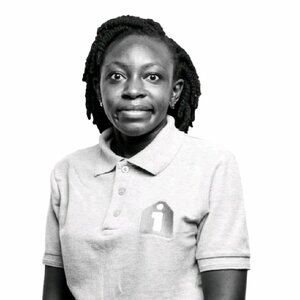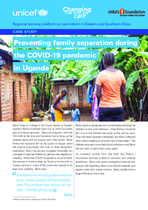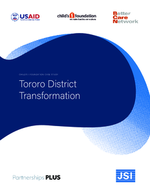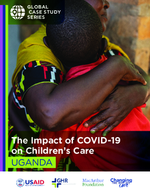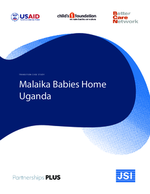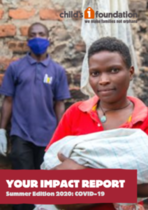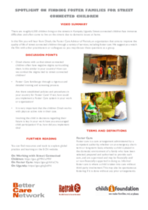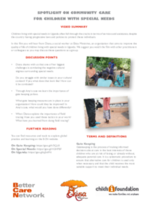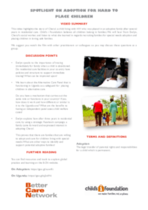Child’s i Foundation works with the government, local partners, grassroot organisations, and a movement of parents and their children, to highlight the harm and cost of orphanages in Uganda and globally.
Child’s i Foundation is building a roadmap for sustainable alternatives to orphanages: Truly social services run by and for communities to strengthen families and provide the support needed to raise their children in safe and loving families.
The organization is helping to reimagine the whole child protection and care system, repurpose orphanages, and rebuild services at the heart of communities designed to support and strengthen birth, foster and adoptive families.
They plan to support organizations in Uganda to transition and which organizations to work with through self referral (institutions approaching us for support), referral (institutions being referred by someone else e.g. government official and during training. After identification, due diligence is done to determine the appropriate partners.
Where they operate
Contact this organization about:
Organization Size
Headquarters Location
Uganda
Organization Type
Main Areas of Work
Systems Strengthening
And they work with local partners to create community networks, and work with the Government of Uganda to build a national social workforce, to help a nation reimagine the care of its most vulnerable citizens.
Family Strengthening
They help repurpose orphanages into community hub centres that provide services that prevent family separation in the first place.
Social Work Training
In 2012, Child's i Foundation established Uganda’s first Social Work Centre of Excellence.
Reunification
Child’s i Foundation helps reunite children with their own families where possible and finds loving, Ugandan adoptive or foster families where the child’s own family cannot be found or is unsafe.
Family Tracing
The Child’s i Foundation provides short-term care to children in Uganda, traces their extended families and reunites them or places them with foster/adoptive families.
Advocacy Locally and Through Transform Alliance Africa
Skills Training
Supporting Organisations to Transition to Family-Based Care
Child’s i Foundation plans to support organizations in Uganda to transition. They determine which organizations to work with through self referral (institutions approaching us for support), referral (institutions being referred by someone else e.g. government official and during training. After identification, due diligence is done to determine the appropriate partners.
We asked this organization to tell us a little more about their learning and knowledge sharing practices. Here is what they said
- Transformation of a district
- Advocacy milestones - influencing some of the key policies
- Piloting foster care to enable our own transition
- Transforming a district: https://www.youtube.com/watch?v=BgnY2_wyBR4
- Community development networks and community volunteer work: https://www.youtube.com/watch?v=iI7FIu4ICqc&t=14s/
- Child protection: https://www.youtube.com/watch?v=LIC3ggVHT4w&t=1s
- Always make sure you have political will; this has been both a good and hard lesson for us.
- Let communities lead; they already have most of the solutions, even when you have an idea. This has enabled so much more good and good will.
- Regular programme implementation meetings
- Safeguarding meetings where we discuss child protection issues in practice
- Monitoring and evaluation process - progress report review
- Supervision meetings
- Group supervision, group counselling and reflection meetings
- Through our community groups--peer parent groups/care leavers/adoptive parents/foster carers--we encourage feedback, learning and sharing of experience.
- Development of learning material. We have developed learning material with Makerere University for social work practice.
- We are developing trauma-informed training to upskill social workers supporting young adults to transition from care.
- Participating in learning webinars with other organisations
- Presenting at conferences nationally and globally
Organization Resources
This case study tracks the impact of family support services to a Ugandan mother and her family during the COVID-19 pandemic in an effort to prevent family separation.
Based in Uganda, Child’s i Foundation successfully transitioned their residential programs before deciding to expand their vision and seek to bring about care reform to the entire district of Tororo. Partnering with the district level government and several CCIs, Child’s i Foundation carried out an extensive analysis and assessment of the Tororo region which provided information to guide the ensuing transitions of CCIs throughout the region.
This case study is part of a series of case studies conducted in India, Kenya, Moldova and Uganda over the course of 2020-2022 to share information on how COVID-19 has and is affecting family-child reunification, alternative care placement, and offers recommendations for family- and community-based care of vulnerable children in the context of COVID-19 and future emergencies.
Overtime, and after realising the full cost of running even a small residential program, and witnessing first-hand the developmental gains made by children once placed in foster care, Child’s i Foundation made a decision to fully transition and phase out their residential care program entirely.
This report from Child's i Foundation provides an overview of the organisation's response to the COVID-19 pandemic in Uganda.
In this video from Time for Global Action: Advancing the Sustainable Development Goals, Stephen Ucembe shares his experience of living in an orphanage and how institutionalization was detrimental to his development and wellbeing.
In this video, Dinah Mwesigye, a social worker at Retrak in Kampala, Uganda, describes the process of finding foster families for street-connected children who are not able to be reunified with their biological families.
In this video, social worker Diana Nyakarungi describes how Ekisa Ministries in Jinja, Uganda supports parents to care for their children with special needs within the community.
In this video, social worker Evelyn Nateza describes the process used by Child's i Foundation to find Ugandan adoptive families for hard-to-place children.
In this video, Maureen Orogot, a Social Worker at Child’s i Foundation in Uganda, shares the progress Child’s i Foundation has made on transitioning from a residential care model of alternative care to professional foster care.

